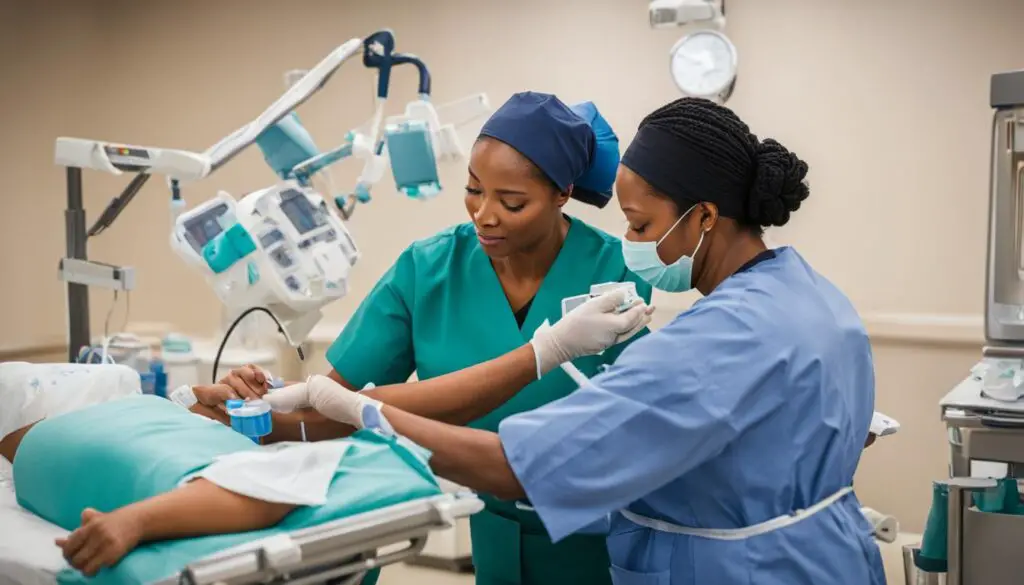
Becoming a Labor Delivery Nurse is a fulfilling career choice, offering the chance to be present for significant moments in the lives of families. These healthcare professionals specialize in providing essential care during the birthing process, ensuring that both the mother and newborn are well taken care of. The role of a Labor Delivery Nurse demands specialized knowledge, compassion, and quick-thinking skills.
In this article, we will explore the opportunities available in this profession, and the skills required to excel in it. Whether you are seeking a rewarding career in healthcare or a shift from a related field, Labor Delivery Nursing could be the ideal path for you.
Job Profile of a Labor Delivery Nurse
A Labor Delivery Nurse is a healthcare professional responsible for providing essential care during the birthing process. Their job involves assisting women during labor and delivery while ensuring the safety and well-being of both the mother and the newborn.
The responsibilities of a Labor Delivery Nurse include:
- Monitoring vital signs, such as blood pressure and heart rate, of the mother and the baby
- Assessing and addressing any complications or risks during the childbirth process
- Administering medication as needed, including pain relievers and epidurals
- Preparing delivery rooms and equipment for childbirth
- Assisting physicians during medical procedures, such as C-articles
- Providing emotional support and guidance to the mother and her support team
They also employ a variety of patient care techniques to ensure the comfort and safety of the mother and baby, such as:
- Encouraging and assisting with breathing and relaxation exercises
- Providing education and coaching on infant care and breastfeeding
- Monitoring infant feeding and output to ensure proper nutrition and hydration
- Performing newborn assessments and screenings
- Administering necessary medications and treatments to the newborn
Entry Opportunities and Demanding Countries
There are various entry opportunities for aspiring Labor Delivery Nurses, including completing a nursing degree program and obtaining relevant certifications. It is important to research the specific educational and licensing requirements for the country or state where you wish to work.
Some countries with high demand for Labor Delivery Nurses include:
| Country | Demand |
|---|---|
| United States | High |
| Canada | High |
| United Kingdom | Medium to high |
| Australia | High |
Working in countries with high demand for Labor Delivery Nurses can provide excellent opportunities for career growth and development.
Labor Delivery Nursing: The Situation in the U.S.
The demand for labor and delivery nursing in the United States remains consistently high, with employment prospects expected to grow by 12% from 2018 to 2028. These healthcare professionals play a crucial role in providing patient care, ensuring safety during delivery and supporting the new mother through a significant life event.
In the U.S., labor and delivery nurses work in diverse healthcare settings, including hospitals, birthing centers, and clinics. However, they face unique challenges due to the fragmented healthcare system, insurance issues, and nursing shortages. These challenges can make it difficult for nurses to provide the highest level of care, especially for those who work in rural or underprivileged areas.

| State | Employment | Hourly mean wage | Annual mean wage |
|---|---|---|---|
| California | 27,730 | $65.81 | $136,890 |
| Texas | 19,300 | $35.73 | $74,300 |
| Florida | 17,540 | $32.79 | $68,180 |
The mean annual wage for labor and delivery nurses in the U.S. is $75,510, ranging from $53,760 to $106,530 depending on the state, experience, and certification. California, Texas, and Florida have the highest employment levels and wages in this field.
Becoming a labor and delivery nurse requires specialized education, training, and certification, such as an Associate Degree in Nursing or a Bachelor’s Degree in Nursing. Professionals in this field can further their career growth by pursuing advanced studies and specializations, such as obstetrics or neonatal care.

Labor Delivery Nursing: The Situation in Europe
Europe boasts of a diverse landscape that presents unique challenges and opportunities for labor and delivery nurses. In contrast to the US, European healthcare systems are predominantly publicly funded, providing universal healthcare coverage for citizens.
Midwives and obstetricians are commonly involved in the labor and delivery process in Europe, with labor and delivery nurses typically providing support services and assistance during childbirth. The role of a labor and delivery nurse may vary depending on the country of practice.
| Country | Regulations | Employment Opportunities |
|---|---|---|
| United Kingdom | Registered Nurse training required. Practitioners are overseen by The Nursing and Midwifery Council (NMC). | Public and private health care facilities |
| Germany | Requires specialized education, with the profession regulated by the German Nurses Association. | Public hospitals and private practice |
| France | Registered Nurse training required, with additional training and certification required for practice in labor and delivery. | Public and private health care facilities |
The situation in Europe provides numerous opportunities for aspiring labor and delivery nurses to embark on a fulfilling career path in maternity nursing.
Labor Delivery Nursing: The Situation in Other Regions
While the demand for Labor Delivery Nurses remains high in the U.S. and Europe, the situation in other regions varies greatly. In some regions, there may be limited access to medical care during childbirth, leading to high maternal and infant mortality rates. Maternity nursing is not uniformly defined or regulated, which can limit employment opportunities for skilled professionals in certain places.
| Region | Maternal Mortality Ratio (per 100,000 live births) | Neonatal Mortality Rate (per 1,000 live births) | Access to Skilled Birth Attendants (%) |
|---|---|---|---|
| Africa | 542 | 28 | 50 |
| Asia | 174 | 21 | 79 |
| Latin America and the Caribbean | 64 | 10 | 91 |
| Oceania | 153 | 17 | 65 |
In some regions, such as parts of Asia and Africa, there is a high demand for skilled maternity healthcare professionals. However, political instability and economic challenges can create instability in healthcare systems and make it difficult for healthcare professionals to deliver essential services.
Nonetheless, the demand for skilled Labor Delivery Nurses globally remains high, and opportunities for nursing professionals with relevant skills wishing to work in other regions are available. Gaining additional specialized skills and knowledge can make the difference between a successful and fulfilling career or one that falls short.
Training and Studies for Labor Delivery Nurses
Obtaining the proper education and training is critical for those who wish to pursue a career in Labor Delivery Nursing. One of the primary educational pathways to becoming an LDN is by completing a Bachelor of Science in Nursing (BSN) degree program. Such programs typically include coursework in anatomy and physiology, pharmacology, and patient care.
Several institutions, including leading universities and healthcare centers, offer specialized programs and certifications for Labor Delivery Nurses. These programs incorporate hands-on training and clinical experiences to prepare nurses for the unique demands of labor and delivery.
LDNs must possess exceptional skills in communication, critical thinking, and collaboration. Additionally, these professionals must be knowledgeable in perinatal care, maternal-fetal physiology, and neonatal resuscitation. Receiving ongoing professional development and participating in training programs can help LDNs stay current with the latest healthcare practices and emerging technologies.

Labor Delivery Nursing Education and Training Programs
| Program | Description |
|---|---|
| Bachelor of Science in Nursing (BSN) | A four-year degree program that provides students with the necessary knowledge and skills to become a Registered Nurse (RN), including courses on labor and delivery nursing |
| Associate Degree in Nursing (ADN) | A two-year degree program that provides basic education and training in nursing, including courses in labor and delivery nursing |
| Master of Science in Nursing (MSN) | An advanced degree program designed for RNs who wish to specialize in labor and delivery or become a Nurse Midwife or Nurse Practitioner in Women’s Health |
| Labor Delivery Nurse Certification | A specialized certification program offered by various organizations, including the National Certification Corporation, providing LDNs with specialized knowledge and clinical skills in labor and delivery nursing |
Alongside formal education and training programs, aspiring LDNs can acquire experience working in healthcare support roles related to childbirth care, such as Obstetric Technician or Doula, to gain practical skills and insight into the field. Although job requirements may differ between institutions and regions, obtaining the necessary education, training, and experience is essential for ensuring a fulfilling and rewarding career as a Labor Delivery Nurse.
Application and Employer Sectors
The application process for labor and delivery nursing positions can vary based on the employer and the sector. Hospital settings are the most common places of employment for Labor Delivery Nurses, with private obstetric practices and birth centers as other options. Additionally, the home care sector is becoming more prevalent, providing a unique opportunity for patients who desire a more comfortable and personalized birthing experience.
Employment sectors for Labor Delivery Nurses can extend beyond healthcare, with options such as teaching and research, public health, and advocacy. Specializing in the application and use of specific medical technologies is also another career path within the field.
| Sector | Description |
|---|---|
| Hospital Settings | These institutions offer the most common place of employment for Labor Delivery Nurses. |
| Private Obstetric Practices and Birth Centers | Provide alternative work settings away from hospitals with a more personalized birthing experience. |
| Home Care | Provides patients with the comfort of giving birth in their own homes, with care tailored to their unique needs and preferences. |
With the rise of telemedicine and virtual health services, there is also an increasing number of opportunities for Labor Delivery Nurses to work remotely, providing support and consultation services to patients and healthcare providers.
Salary, Development Opportunities, and Promotion Prospects
Labor Delivery Nurses play a vital role in the healthcare industry, and their expertise is highly valued. According to Bureau of Labor Statistics, the median annual wage for registered nurses in the U.S. was $75,330 in 2020. The salary range for Labor Delivery Nurses may vary depending on factors such as the location, employer, and level of experience.
Furthermore, the profession of Labor Delivery Nursing offers a wide range of development opportunities. Nurses can continue their education and pursue advanced degrees such as a Master of Science in Nursing. By specializing in areas such as midwifery, neonatal care, or women’s health, Labor Delivery Nurses can expand their knowledge and enhance their skills and earning potential.
Promotion prospects are robust within the field of Labor Delivery Nursing. With extensive experience and advanced degrees, nurses can advance to positions such as nurse practitioner, clinical nurse specialist or nurse manager. These roles offer additional responsibilities, the opportunity to lead teams, and the possibility of increased earning potential.
Required Skills and Similar Jobs
Becoming a Labor Delivery Nurse requires possessing an array of essential skills, including excellent communication, attention to detail, critical thinking, and problem-solving abilities. It is imperative to acquire a specialized knowledge of childbirth physiology, medical procedures, and patient care techniques to excel in this profession. Labor Delivery Nurses must also possess the emotional stability to provide support during critical moments.
If you are interested in maternity nursing but prefer a different role than that of a Labor Delivery Nurse, several career paths offer similar job opportunities. Obstetrics and Gynecology Nursing, Neonatal Nursing, and Midwifery are a few alternatives you can explore. Each of these fields focuses on providing medical support to women and infants throughout the childbirth process, with responsibilities varying according to the role and level of expertise.
Regardless of the career path you choose, the field of maternity nursing offers fulfilling and rewarding opportunities for those passionate about supporting mothers and infants during significant moments in their lives.
Questions and Answers
What is a Labor Delivery Nurse?
A Labor Delivery Nurse is a healthcare professional specialized in providing care and support to women during the birthing process. Their primary role is to ensure the safety and well-being of both the mother and the newborn.
What are the responsibilities of a Labor Delivery Nurse?
Labor Delivery Nurses assist women during labor and delivery, monitoring vital signs, administering medications, and providing emotional support. They also collaborate with doctors and other healthcare professionals to ensure a smooth birthing process.
Are there entry opportunities for aspiring Labor Delivery Nurses?
Yes, there are various entry opportunities for individuals interested in becoming Labor Delivery Nurses. These include pursuing a Bachelor of Science in Nursing (BSN) degree, attending specialized training programs, and gaining relevant work experience in maternity or labor and delivery units.
Which countries have a high demand for Labor Delivery Nurses?
Countries such as the United States, Canada, Australia, and the United Kingdom have a high demand for Labor Delivery Nurses due to the growing population and the need for skilled healthcare professionals in labor and delivery units.
What is the current state of labor and delivery nursing in the United States?
In the United States, there is a significant demand for Labor Delivery Nurses due to the increasing birth rate and the need to provide quality care during labor and delivery. However, the U.S. healthcare system poses unique challenges, including staffing shortages and high workload.
How does labor and delivery nursing differ in Europe?
The landscape of labor and delivery nursing in Europe varies across countries and healthcare systems. Each country has its own regulations and educational requirements for practicing as a Labor Delivery Nurse. However, the focus on providing safe and supportive care during childbirth remains consistent.
What are the training and study requirements for aspiring Labor Delivery Nurses?
To become a Labor Delivery Nurse, individuals must complete a nursing program and obtain a nursing license. Many nurses also pursue additional certifications in areas such as neonatal resuscitation, fetal monitoring, and breastfeeding support to enhance their skills in providing comprehensive care during childbirth.
In which sectors and industries do Labor Delivery Nurses find employment?
Labor Delivery Nurses can find employment opportunities in various settings, including hospitals, maternity clinics, birthing centers, and even patients’ homes for those providing home birth services. They may also work for public health agencies, educational institutions, or nonprofit organizations focused on maternal and child healthcare.
What salary range can Labor Delivery Nurses expect?
The salary of a Labor Delivery Nurse can vary depending on factors such as experience, location, and the employing institution. On average, however, Labor Delivery Nurses in the United States earn a competitive salary, with the potential for higher earnings with experience and advanced certifications.
What are the promotion prospects for Labor Delivery Nurses?
Labor Delivery Nurses have opportunities for career advancement and professional growth. They can pursue leadership roles, such as becoming a charge nurse or a nurse manager, or specialize in areas such as lactation consulting or childbirth education. Additionally, advanced practice roles, such as becoming a nurse-midwife or a nurse practitioner in women’s health, are also available.
What are the required skills for a successful Labor Delivery Nurse, and what are some similar professions?
Successful Labor Delivery Nurses possess excellent communication and interpersonal skills, as well as the ability to remain calm under pressure. They must also be knowledgeable in childbirth processes and be able to provide emotional support to women and their families. Similar professions include nurse-midwives, obstetricians, neonatal nurses, and perinatal nurses.
